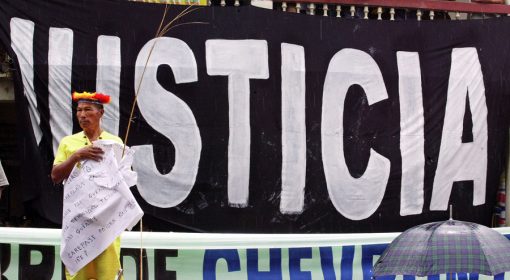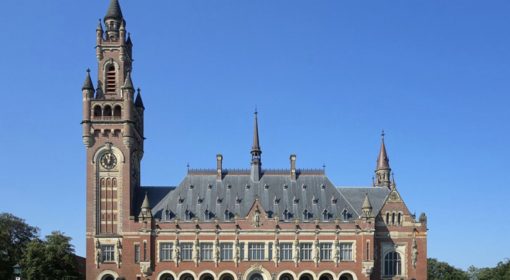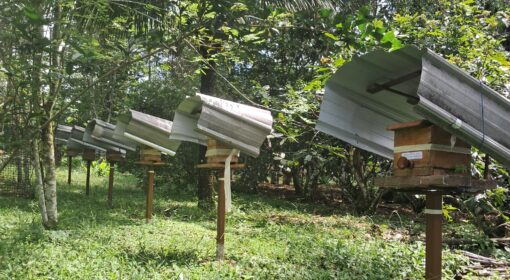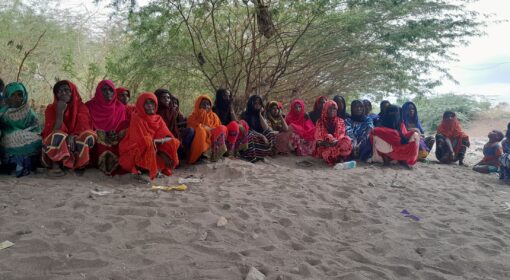By Letty Fajardo Vera
on the occasion of the International Women Day 2021
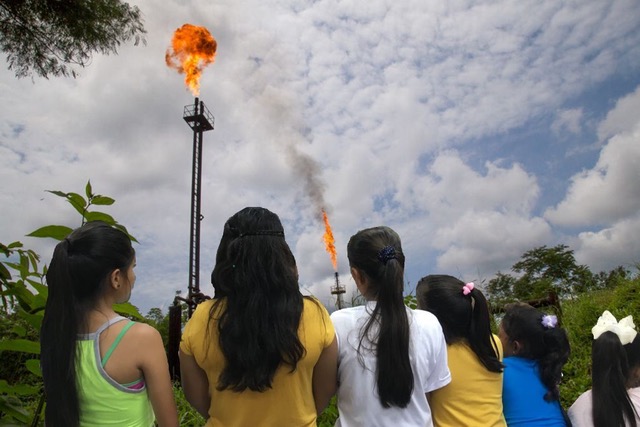
Between 1964 and 1990 Texaco (acquired by Chevron in 2001) operated an oil concession of approximately 500,000 hectares between the provinces of Sucumbíos and Orellana in the Ecuadorian Amazon. Other companies were part of the consortium, but it was Texaco that was in charge and responsible for implementing all the technical and operational aspects of hydrocarbon extraction. In order to save money, the company deliberately used obsolete and inadequate technologies, many of which were already banned in the USA at the time because of their high human and environmental impact. The careless practice of Texaco/. Chevron of discharging wastewater into the rivers and open pits and the many oil spills created a wasted area the size of Switzerland.
Then there were also 447 flares that for more than 40 years, in the heart of the rainforest have been burning residual gases from the oil extraction in the open air. This spoiled the area even more. The toxic gases from this process cause among others the odour sickness syndrome also called cacosmia, causing irritability, joint and muscle pain, tiredness, constipation, indigestion, headaches, insomnia, memory problems, difficulty of concentrating, daytime drowsiness and grogginess, and tinnitus (noise in the ears). Women tend to be more susceptible than men to the effects of the gas flaring.
What also persisted is the carcinogenicity. The oil pollution was rich with polycyclic aromatic hydrocarbons, that are highly toxic and known to cause cancer. As a result, the Amazon became Ecuador’s cancer hot spot. There is a high concentration cancer among inhabitants of the oil exploitation area in the Amazon. This suffering has fallen mainly on women: in the Amazon 70% of the people diagnosed with cancer are women. It particularly affects breasts, thyroid and cervix.
What makes it even harder is that there is no medical system to treat cancer in the Amazon. Patients need to travel to the Ecuadorian capital Quito to get treatment. Take the case of Carmen Samaniego. Carmen is a schoolteacher. Five years ago, she was diagnosed with cancer. Now she is travelling every month to Quito for treatment, staying there sometime up to 15 days. For this she gets small support in travel costs from the government, but the procedure to get this small support is cumbersome and bureaucratic.
Carmen and her family have no reserves. When she travels the nine hours to and from the Hospital by bus, however sick, she travels alone. She is not able to afford a second ticket. When she is in Quito though the medical care is free, she has to pay for a place to stay. This often leaves her without money to buy food. The choice than is to travel and be hungry.
Believe it or not: in her own words she is ‘better-off’. There are many other women in Sucumbios and Orellana Province – also diagnosed with cancer – that are too ill to travel or even poorer – not finding the means to go for treatment to Quito. It is hardship all over.
Seeing their mothers and some school friends suffer and afraid of their own future, nine young girls aged between seven to sixteen years from the province of Sucumbios and Orellana took an unprecedented action, taking the Ecuadorian State to court. Among them is Denisse Nunez– the thirteen-year-old daughter from Carmen Samaniego. On 26 January the nine girls won a Constitutional Action against the Ecuadorian State, The court found that flaring violates the rights of nature, the right to a clean environment, the right to health, water, and food security, and as well as the climate change commitments related to emission reduction. The next battle is the enforcement of this court ruling. Further information is available via Therightofnature.org and Amazonfrontlines.org.
According to a report by Global Cancer Observatory cancer caused the same number of deaths in 2020 as COVID-19 in Ecuador. Covid-19 has complicated the already critical situation of cancer patients in the Ecuadorian Amazon: their treatments have been delayed, putting their lives at risk and giving time for the cancer to develop.
For more information contact: amazonia2all@gmail.com
